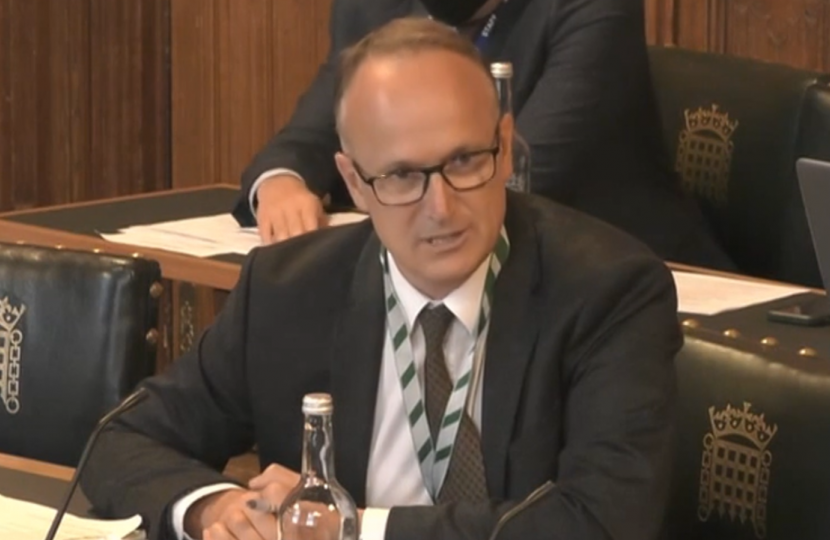
MPs on the Environment, Food and Rural Affairs (EFRA) Committee are embarking on a wide-ranging inquiry into Rural mental health .
Farming and other agriculture-related professions are known to face particular mental health challenges, with higher-than-average rates of depression and suicide. Improving the overall quality of mental health provision has been an increasing priority for the Government and the NHS in recent years.
The Chair of the EFRA Committee, Neil Parish MP, said:
“I’m pleased we’re starting this vital work. It's important we talk openly about these issues and the help that is available. Mental health matters to us all. But for some people working in rural communities there are special factors that are often hidden in a world that sometimes feels like it is driven by those living in towns and cities.
“I’m a farmer myself and I know how people in our communities can sometimes suffer from isolation. That’s not to mention how insecure incomes, volatile weather and many other issues can be real stress factors.
“We hope to look into all of these subjects and more - then make recommendations about how the government can improve mental health provision in rural communities.
“I encourage everyone with a take on this subject – whether professional or personal - to take part in our inquiry. The ways to let us know your views are set out below.”
Dr Neil Hudson, MP for Penrith and The Border and member of the EFRA Committee said:
“I am really pleased that our cross party EFRA Committee is launching this inquiry into rural mental health. This is such an important issue for our rural communities who have to deal with isolation, stressful businesses and shocks like floods and animal disease outbreaks. As a vet myself, a profession in this sector with a higher than average incidence of mental health issues and suicide, I know how important it is that we shine a light on these issues. That way if we talk about them, we can improve the help and support that is available. I really encourage people to take part and submit evidence to our inquiry”
Where to get help if you need it
The EFRA Committee realises that the issues raised in this inquiry may be sensitive or upsetting. The following organisations may be able to offer support or further information:
Samaritans – general support for everyone: call 116 123 - 24 hours a day, every day; email [email protected]
Mind – for information, advice, and support for anyone experiencing a mental health problem. Call: 0300 123 3393
Citizens Advice - for independent, free advice provided by a network of charities - online, by phone or in person. Covers a wide variety of issues including benefits, work, debt, housing, family and immigration. Adviceline is available 9am to 5pm, Monday to Friday - 0800 144 8848
Background – mental health in a rural context
The NHS Long Term Plan, published on 7 January 2019, sets out the NHS’s aim to advance mental health equalities. It commits to providing an additional 380,000 people per year with access to adult psychological therapies by 2023/24.
Mental health support is often concentrated in areas of high population. Access to services in rural and remote communities can be limited due to a lack of facilities and other factors such as limited public transport. It’s been argued that the low visibility of mental health service in these communities can lead to culture of ‘self-reliance’ which can prevent people from seeking support early. Instead, some people only seek support when they have already reached ‘crisis’ stage.
The quality of mental health support in rural area in response to ‘shocks’ – such a flooding and animal culls - has also been raised during EFRA Committee inquiries into other topics.
The Farm Safety Foundation reports that that one farmer a week in the UK dies by suicide, while research by Edinburgh University has shown that the rate of suicide in the veterinary profession is at least three times that of the general population. According to the Farm Safety Foundation, 81% of farmers under 40 believe that mental health is the biggest hidden problem facing farmers today. Furthermore, 92% believe that promoting good mental health is “crucial” if lives are to be saved and farmers kept safe.
How you can take part in the inquiry
The EFRA Committee has established ‘terms of reference’ for the inquiry to define and organize its work. We hope this will help guide your contributions. The Committee usually works by soliciting written submissions on several topics. It studies and takes those contributions into account. Then it also invites selected individuals, or representatives of groups and organisations, to give oral evidence before the Committee.
We usually invite a government minister or senior officials to give oral evidence towards the end of an inquiry, once we have gathered a good range of evidence and formulated relevant questions to ask.
The terms of reference for this inquiry state that the Committee is interested in gathering evidence on following topics:
- What specific mental health challenges are faced by those living and working in rural communities?
- What is the current state of mental health & suicide prevention service provision for those working in agriculture and those living in rural areas? Do they meet the specific needs of that community?
- What are the causes of the higher-than-average rate of suicide amongst those working in agriculture? How are other associated professions, such as vets, affected? How effective are suicide prevention services offered to these groups?
- Is sufficient mental health support made available to rural communities following ‘shocks’ such as flooding or mass animal culls?
- Does the Government’s recent investment in mental health services adequately provide for rural mental health?
- How ‘joined-up’ are key actors such as the Department for the Environment, Food and Rural Affairs, the Department for Health and Social Care, NHS England, Public Health England and Local Governments in their approach to improving the quality of, and access to, mental health services in rural and agricultural communities?
If you would like to submit written evidence, please click on the link in the next paragraph which will take you to a webpage with relevant information. Please submit your contributions by 7 January 2022.
Important information about your submission
Guidance on giving evidence to a select committee of the House of Commons is available here
You don’t need to answer all the questions in the terms of reference. Please tell us anything you think relevant, even if it isn’t covered by these questions. The Committee will consider all the evidence it receives and normally publishes all its evidence online where it will be available permanently for anyone to view.
Please consider carefully how much personal information you need to share. If you include personal information about other people in your submission, the Committee may decide not to publish it. Your contact details will never be published.
Please be aware that some of the written evidence published as part of this inquiry may contain content which some readers might find distressing. The Committee can also accept your submission anonymously (meaning it will be published but without your name), or confidentially (meaning it won't be published at all). If you would like us to treat your evidence in one of these ways, please say so at the start of your evidence and tell us why. The final decision on whether to publish your evidence will be taken by the Committee. If your evidence raises any safeguarding concerns about you, or other people, then the Committee has a duty to raise these with the appropriate safeguarding authority.



